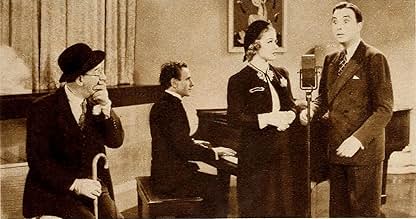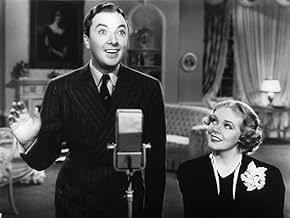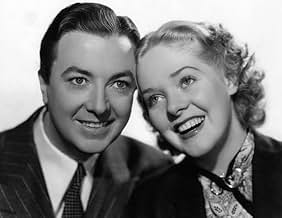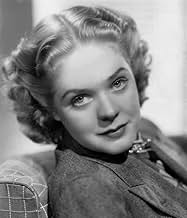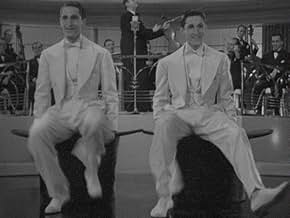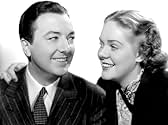IMDb RATING
6.8/10
166
YOUR RATING
Satire on radio, built around the supposed feud between bandleader Ben Bernie and journalist Walter Winchell.Satire on radio, built around the supposed feud between bandleader Ben Bernie and journalist Walter Winchell.Satire on radio, built around the supposed feud between bandleader Ben Bernie and journalist Walter Winchell.
- Awards
- 2 wins total
Ben Bernie
- Ben Bernie
- (as Ben Bernie and His Orchestra)
Steve Condos
- Specialty Dancer
- (as Condos Brothers)
Nick Condos
- Specialty Dancer
- (as Condos Brothers)
Featured review
Walter Winchell started in vaudeville as a performer in Gus Edwards's 'School Days' act. (A fictionalised version of this remarkable troupe became Bing Crosby's movie 'The Star Maker'.) Between engagements, Winchell wrote and published a vaudeville newsletter, filled with showbiz gossip. He eventually became a newspaper/radio columnist, utterly ruthless in his power, quick to destroy an enemy's career and (less frequently) to aid a friend. (The Broadway revue 'Hellzapoppin' was trashed by all the critics, yet ran for more than 3 years because Winchell plugged it in his column every single day.) Although many actors and entertainers desperately coveted a mention in Winchell's column, nearly everyone in show business despised him. (Ed Sullivan once threatened to shove Winchell's head into a toilet.) Winchell wisely avoided feuding with his many enemies, aware that such action would only give them free publicity. One of Winchell's few real friends was popular radio bandleader Ben Bernie, and the two concocted a public 'feud' that was a long-running publicity stunt for them both. Several movies - most notably 'Sweet Smell of Success' and 'Blessed Event' - feature fictional journalists who are blatantly based upon Winchell.
'Wake Up and Live', an above-average Fox musical, features Winchell and Bernie playing themselves ... or, rather, fictionalised versions of themselves, designed to make Winchell look good and their phony feud look genuine. In a staged scene, Winchell rattles off his extensive knowledge of obscure nightclub acts while identifying a masked singer after hearing only a few notes. In another scene - equally staged, but funny - a shifty promoter played by Walter Catlett tries to offer Winchell a bribe. Winchell takes the money but immediately drops it into a charity poorbox. Catlett attempts to retrieve the cash, only to attract the interest of a passing policeman. This scene pays tribute to one of Winchell's few genuine redeeming traits: he was active for many charitable causes. (Winchell founded the Damon Runyon Cancer Fund.) It's fascinating to see Winchell onscreen, even though he's clearing playing a sanitised version of himself. To see him here, you'd never guess he bullied his daughter unmercifully and drove his son to suicide.
Although Winchell and Bernie are prominently featured, the frothy plotline centres on Jack Haley as a would-be radio vocalist and Alice Faye as the singer who encourages him. The sexy and vivacious Faye sings the bouncy title tune. There's a very funny scene in which Haley arrives at the radio station, hoping to audition, when he runs afoul of a sour-tempered studio usher. The usher is played by none other than William Demarest, in his usual mode. It's astonishing to realise that, as late as 1937, Demarest was still playing bit parts like this one ... still, he's very welcome here in his brief scene. Demarest assures Haley that his audition will go well, providing he doesn't get mike fright ... a phenomenon which he then describes to Haley. So, of course, as soon as Haley tries to sing he develops mike fright. There's a delightfully surrealistic sequence in which we see the microphone from Haley's viewpoint, as it morphs into a snarling demon!
There are some lively but irrelevant speciality acts, including a couple of dance routines that would never perform on an actual radio show. Lots of familiar faces in the cast list, and Patsy Kelly is less annoying than usual. The title song is the only good one here. One interesting trivia note: the opening credits of this movie feature two guys from the art department named Mark-Lee Kirk and Haldane Douglas, and their names are stacked onscreen so that 'Kirk' is directly above 'Douglas'. I wonder if a certain dimple-chinned actor, just aspiring to a film career at this point, took his screen name from the credits of this movie? I'll rate 'Wake Up and Live' 9 points out of 10.
'Wake Up and Live', an above-average Fox musical, features Winchell and Bernie playing themselves ... or, rather, fictionalised versions of themselves, designed to make Winchell look good and their phony feud look genuine. In a staged scene, Winchell rattles off his extensive knowledge of obscure nightclub acts while identifying a masked singer after hearing only a few notes. In another scene - equally staged, but funny - a shifty promoter played by Walter Catlett tries to offer Winchell a bribe. Winchell takes the money but immediately drops it into a charity poorbox. Catlett attempts to retrieve the cash, only to attract the interest of a passing policeman. This scene pays tribute to one of Winchell's few genuine redeeming traits: he was active for many charitable causes. (Winchell founded the Damon Runyon Cancer Fund.) It's fascinating to see Winchell onscreen, even though he's clearing playing a sanitised version of himself. To see him here, you'd never guess he bullied his daughter unmercifully and drove his son to suicide.
Although Winchell and Bernie are prominently featured, the frothy plotline centres on Jack Haley as a would-be radio vocalist and Alice Faye as the singer who encourages him. The sexy and vivacious Faye sings the bouncy title tune. There's a very funny scene in which Haley arrives at the radio station, hoping to audition, when he runs afoul of a sour-tempered studio usher. The usher is played by none other than William Demarest, in his usual mode. It's astonishing to realise that, as late as 1937, Demarest was still playing bit parts like this one ... still, he's very welcome here in his brief scene. Demarest assures Haley that his audition will go well, providing he doesn't get mike fright ... a phenomenon which he then describes to Haley. So, of course, as soon as Haley tries to sing he develops mike fright. There's a delightfully surrealistic sequence in which we see the microphone from Haley's viewpoint, as it morphs into a snarling demon!
There are some lively but irrelevant speciality acts, including a couple of dance routines that would never perform on an actual radio show. Lots of familiar faces in the cast list, and Patsy Kelly is less annoying than usual. The title song is the only good one here. One interesting trivia note: the opening credits of this movie feature two guys from the art department named Mark-Lee Kirk and Haldane Douglas, and their names are stacked onscreen so that 'Kirk' is directly above 'Douglas'. I wonder if a certain dimple-chinned actor, just aspiring to a film career at this point, took his screen name from the credits of this movie? I'll rate 'Wake Up and Live' 9 points out of 10.
- F Gwynplaine MacIntyre
- Jun 11, 2004
- Permalink
Storyline
Did you know
- TriviaJack Haley's singing was dubbed by Buddy Clark.
- ConnectionsFeatured in Tap dance (1989)
- SoundtracksThere's a Lull in My Life
Music by Harry Revel
Lyrics by Mack Gordon
Performed by Alice Faye (voc) and Ben Bernie and his Orchestra (as Ben Bernie's Orchestra)
Details
- Runtime1 hour 31 minutes
- Color
- Aspect ratio
- 1.37 : 1
Contribute to this page
Suggest an edit or add missing content

Top Gap
By what name was Fantôme Radiophonique (1937) officially released in Canada in English?
Answer
















